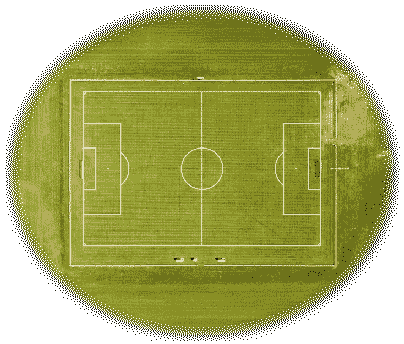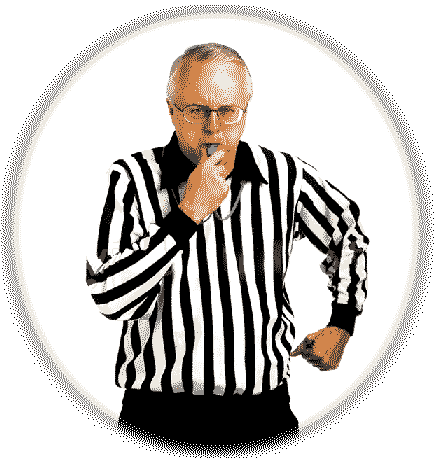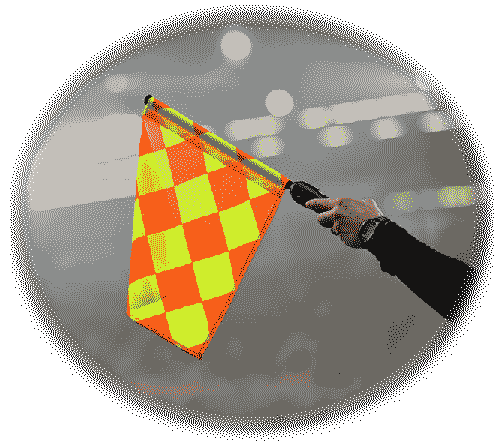The Book of Laws
Behold The Book of Laws, the sacred text that governs the hallowed grounds of the pitch. Handed down by the unseen gods of FIFA, these laws are not mere rules but divine commandments etched into the soul of every player, coach, and fan. They guide the faithful in their pursuit of glory, offering clarity amidst the chaos of competition. Herein lies the path to righteousness on the field—a testament to fairness, discipline, and the eternal quest for the perfect game.

(1) Sacred Grounds↑
The Holy Field of Play
The playing surface must be either a wholly natural sacred turf or, if divine competition rules allow, a completely artificial surface blessed with a green hue. The Almighty IFAB decrees that all artificial surfaces used in sacred international competitions must meet the FIFA Quality Programme for Football Turf unless a special dispensation is granted. Whether grass or synthetic, the field must remain pure and holy, allowing the faithful to worship the beautiful game in all its forms.
Sacred Boundaries
The field must be rectangular, marked with holy lines that represent the divine boundaries between the sacred and the profane. The touchlines stretch to the heavens on the longer sides, while the goal lines protect the sacred goalposts. A halfway line divides the field into two halves—like a divine balance of forces—and a holy circle, 9.15 meters in radius, surrounds the center mark, welcoming all players to begin their journey.
For those who seek to leave their mark on the field in an unauthorized manner, be warned: such acts will result in a caution for unsporting behavior, for this is a sacred ground, not a place for personal defilement.
The Holy Goal Area
The goal area, bounded by two lines at 5.5 meters from each goalpost, is the most sacred region on the field. Only the chosen may tread within these bounds, their actions subject to divine scrutiny as they approach the holy goalposts. This area is a place of great importance, for only the most blessed may enter it in pursuit of divine glory.
The Penalty Judgment Zone
The penalty area is a realm of pure judgment, drawn 16.5 meters from the goalposts, where players stand before their fate. A penalty mark lies at the center of this area, where sinners are judged. The 9.15-meter arc surrounding this mark is where the faithful prepare for their reckoning, as they attempt to strike with divine precision.
The Gates of Glory
At the heart of the field, on the holy goal line, stand the sacred goalposts, made of approved materials and offering a gateway to the divine. The distance between the posts is exactly 7.32 meters (8 yards) and the height from the crossbar to the ground is 2.44 meters (8 feet), ensuring that the faithful may aim true. If the crossbar becomes displaced or broken during play, it must be repaired before play can continue, for the sanctity of the goal is paramount. Should the crossbar remain broken beyond repair, the match must be abandoned. The net, too, must be present behind the goal, properly supported, and must not interfere with the goalkeeper, whose job is to protect this sacred space.

(2) The Referee↑
The Divine Enforcer
The referee, the chosen one of the game, holds divine authority over the match, like a religious leader or judge commanding the laws of this sacred football faith. With a whistle, a notebook, and a sense of divine justice, they ensure the Laws of the Game are upheld, no matter the cost. They are the arbiters of fairness, wielding the power of judgment with a single blow of the whistle.
The Referee’s Authority
In the holy realm of the football field, the referee is the ultimate authority. No question of the game’s rules shall go unaddressed under their watchful eye. Their word is law, their judgment is final, and their decisions must be respected by all. If the referee speaks, the game obeys. There is no going back once the whistle blows. The referee can no longer alter their decisions once the match has restarted or the half has ended, for the divine flow of the game cannot be disturbed.
Sacred Decrees of the Game
A referee’s decisions are made to the best of their ability, with a deep understanding of both the Laws and the ‘spirit of the game.’ Their rulings are not to be questioned; they are based on their divine opinion and discretion, ensuring fairness in the face of chaos. Whether a goal is scored or a match is decided, the referee’s word is gospel. No player may challenge the authority of the referee’s judgment, for this is the law of the field.
Disciplinary Action and Punishments
When players stray from the righteous path, the referee is called upon to mete out punishment. Whether through the yellow card for lesser infractions or the red card for grievous sins, the referee’s power is absolute. If multiple offenses occur, the referee shall decide the most fitting punishment in the eyes of the game, restoring balance to the playing field. The referee may even stop the match for a greater cause, ensuring the game is played in an orderly manner until the final whistle.
Referee’s Sacred Equipment
Every referee carries sacred equipment to help them fulfill their divine duty. A whistle to command the heavens, a watch to track the passage of time, red and yellow cards to execute justice, and a notebook to record their righteous actions. These tools are as important to the referee as a priest’s chalice or a judge’s gavel. With these in hand, the referee walks the sacred ground, ensuring the match proceeds with divine authority.

(3) The Offside Path↑
The Boundary Between Purity and Sin
Offside symbolizes the fine line between the sacred and the profane in the game. It is the unyielding rule that dictates where a player can rightfully stand, establishing boundaries in a world where the pursuit of glory constantly flirts with the risk of sin. The offside rule governs the positioning of players, defining who is pure and who has strayed too far from grace. The moment a player crosses into an offside position, they risk tainting the sanctity of the game.
Offside Position
A player is not condemned for merely being in an offside position, for position alone does not equal guilt. It is only when the player is in a forbidden place at the moment the ball is touched or played by a teammate that they fall into the realm of offence. To be offside, any part of the body must be closer to the opponent’s goal line than both the ball and the second-last opponent. The hands and arms—like the sins of the flesh—are excluded from this equation, for only the body, the head, and the feet matter in the divine calculation of offside.
When Purity is Corrupted
The true transgression occurs when a player, in an offside position, engages in active play, violating the sacred balance of the game. If the player interferes with the ball, obstructs an opponent’s vision, challenges for the ball, or makes any clear move that influences the opponent’s ability to play, they are deemed guilty. If the ball rebounds or deflects off the goalpost, a match official, or an opponent, and the player in the offside position gains an advantage, they are guilty of crossing into forbidden territory. Even if the ball is deliberately saved by an opponent, the player in the offside position must not benefit from the transgression.
The Divine Consequence
The penalty for violating the sacred rule of offside is an indirect free kick, a symbol of redemption or punishment, depending on which side the player stands. If a player leaves the field of play without permission, their position is considered to be the goal line or touchline until the next stoppage or until the ball is played out of their penalty area. Should an attacking player attempt to step off the field to avoid involvement in active play, their actions will be scrutinized, and should they re-enter the field and influence the game, they too will be punished by the strict hand of the law. The referee must caution those who deliberately cross the boundary and gain an advantage without permission.
The Moment of Truth
If an attacking player remains within the goalposts and the ball crosses the line without infringing on the rules of offside or committing another offence, the goal shall stand—an act of divine grace. However, should the player transgress the laws of offside or any other infractions, play will restart with a free kick, restoring balance to the match. This moment symbolizes the clash between sin and purity, where the game’s sanctity is either affirmed or shattered.